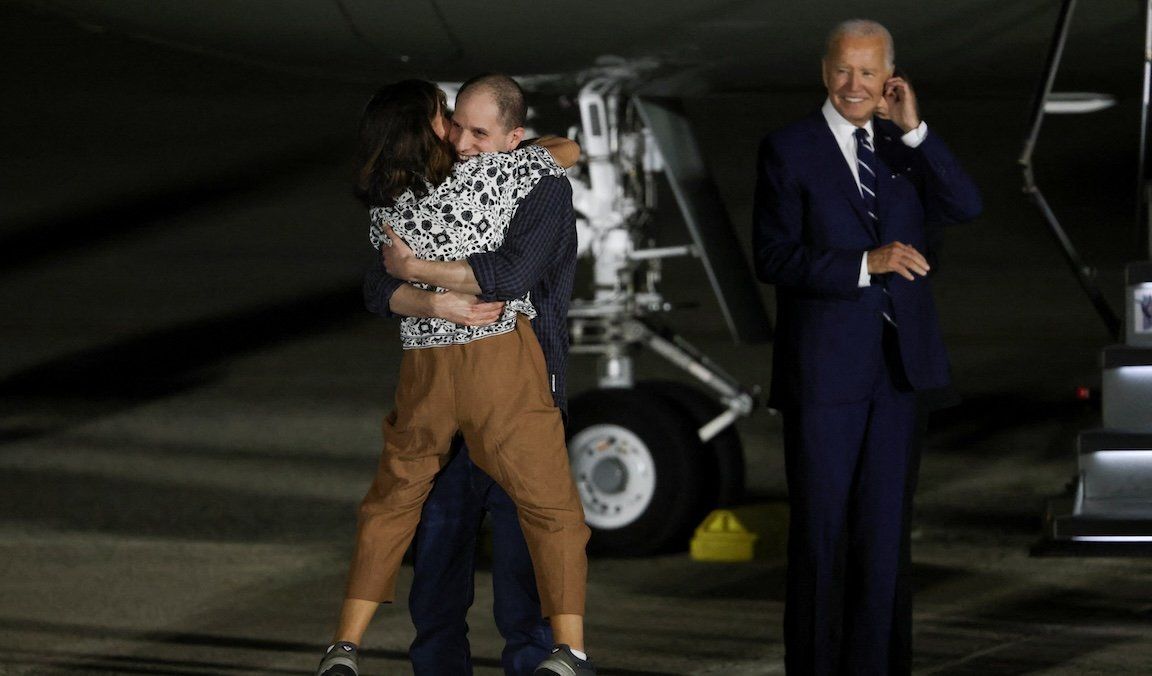They’re free! Wall Street Journal reporter Evan Gershkovich, former US Marine Paul Whelan, journalist Alsu Kurmasheva, and Kremlin critic Vladimir Kara-Murza were released in a major prisoner swap between Russia and the West on Thursday.
President Joe Biden proudly addressed the nation about securing the release of 16 prisoners, including 12 foreigners, noting that it was a “feat of diplomacy.” The plane carrying Gershkovich, Kurmasheva, and Whelan landed at Joint Base Andrews in Maryland late last night, where they were greeted by a heartwarming scene with their families, Biden, and Vice President Kamala Harris.
The less good news: Vadim Krasikov, a Russian imprisoned in Germany for murdering a former Chechen militant, also walked. But he’ll likely be stuck in Russia for the foreseeable future — so we won’t dwell on it.
Why now? Many assumed Vladimir Putin would avoid handing a clear win like this to Biden, or that the Kremlin would exact a bigger price in doing so. But instead, they’ve given up their highest-profile prisoners in exchange for 16 of their own in a politically advantageous win for the Biden-Harris administration. The swap was the result of months of complex negotiations and high-stakes diplomacy.
Still, we don’t know all the details. “We don’t know whether there were any quid pro quos that are not part of the public statements on all of this,” as Sam Greene, director for democratic resilience at the Center for European Policy Analysis, points out. And as for Biden, he says, “Maybe giving him a win isn’t so important [to the Kremlin] anymore.”
But it still surprises Greene “that [the Russians] would take essentially their entire deck of trading cards and cash it in for at least what on the face of it is not a whole heck of a lot.”
Could this signal that Russia is willing to engage in broader diplomacy? Unlikely, says Tinatin Japaridze, a regional expert and analyst at Eurasia Group. “Even though some will interpret the latest move as a signal of potential Russian openness to hold constructive negotiations on Ukraine,” she says, “it is too soon to jump to those conclusions.”
Greene agrees that the swap is unlikely to have a big impact on the war, but he does see room for hope. It upends the Western narrative that there isn’t really a negotiating partner for diplomatic outreach in Moscow. While the prisoner swap didn’t involve anything else Moscow is otherwise fighting for — at least as far as we know — there is one bonus for Russia: “It does kind of send a message or can be seen to send the message that there is a negotiating partner in the Kremlin,” he says.
And Moscow may see this as a now-or-never moment, Greene says. Western F-16s are now landing in Ukraine, which improves Ukrainian capabilities, and the US election looks a little bit less likely to go the way Putin wants (read: for Donald Trump), while the Russians are making progress on the front lines but at a huge cost.
“So maybe they do want to send that signal,” says Greene.
We’ll be watching for any signs of Moscow’s willingness to negotiate.
